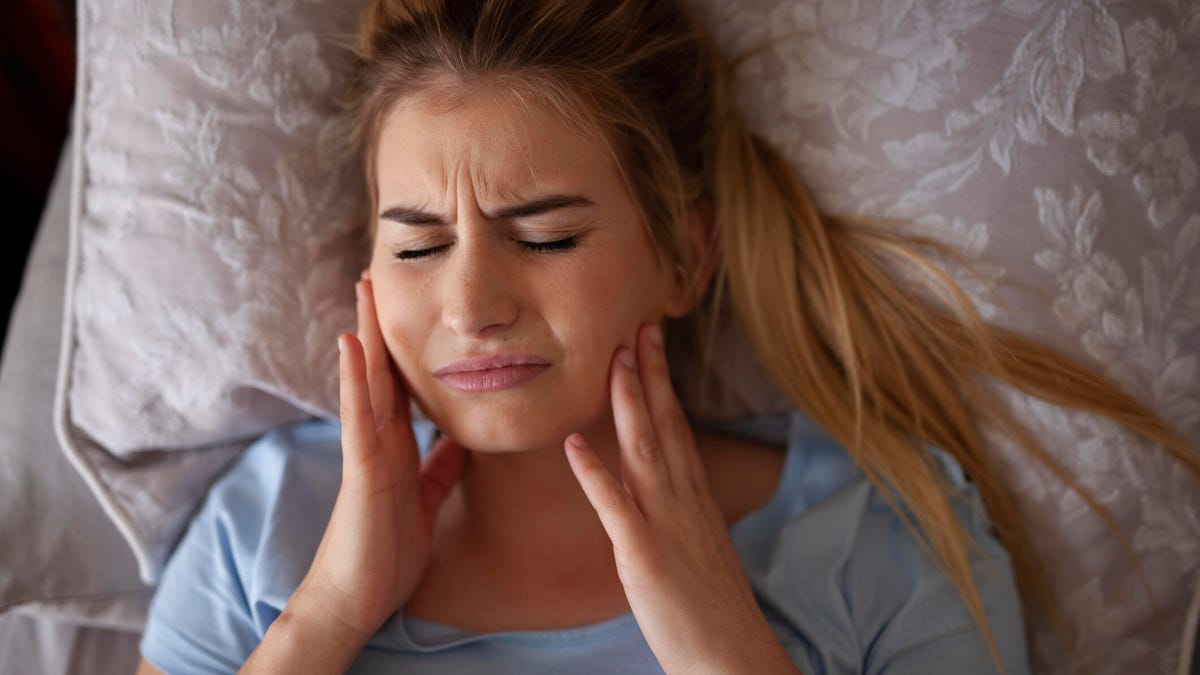
If you wake up with jaw, tooth, ear, or headache pain, especially in the morning, you may have sleep bruxism, meaning you grind or clench your teeth while sleeping. If you have a mild case, you can try to treat it at home and relieve your symptoms. If your case is more severe or doesn’t improve, be sure to see your dentist or doctor for treatment.
Why Do I Grind My Teeth While Sleeping?
Before we explain how to stop teeth grinding, let’s take a step back and see what causes this condition. There are several risk factors for sleep bruxism, including:

- Anxiety and stress
- Taking certain medications, including some antidepressants
- Having an aggressive, competitive, or tense personality
- Unhealthy lifestyle habits, such as drinking alcohol, smoking, and excessive caffeine intake
According to the Mayo Clinic, people who grind their teeth while sleeping are also more likely to have other sleep disorders, such as snoring or sleep apnea.
In some cases, nocturnal teeth grinding can cause tooth damage or loosening, headaches, and jaw or facial pain. Fortunately, there are several natural ways to reduce teeth grinding and enjoy a more restful sleep without medication or surgery.
6 Natural Ways to Stop Teeth Grinding

If you’re concerned about the potential consequences of teeth grinding, there are natural solutions you can try for mild cases. Below, we’ve compiled six home remedies for teeth grinding so you can sleep peacefully and wake up pain-free.
1. Perform Mouth and Jaw Exercises
By performing mouth and jaw exercises, you can relax your jaw, keep your muscles flexible, and potentially prevent or reduce teeth grinding pain.
Sample Exercise:
- Close your lips (without your upper and lower teeth touching).
- Place your tongue on the roof of your mouth, but don’t let it touch your teeth.
- Stay in this position for a few minutes and breathe slowly.
- Repeat several times a day.
You can also massage your jaw muscles to reduce tension around your mouth. To do this, gently press both sides of your jaw with your fingers and move in small circular motions along your face.
2. Limit Caffeine Intake
Caffeinated beverages, including coffee and black tea, can worsen sleep bruxism. If you regularly consume these types of drinks, cutting caffeine from your diet may help you stop nocturnal teeth grinding.
If quitting caffeine abruptly is difficult for you, you can try decaffeinated versions of your favorite products. For example, you can swap your daily espresso for a cup of decaf coffee. Or if you drink tea, you can switch from green tea to decaffeinated herbal tea, which also has the added benefit of promoting sleep and relaxation.
Caffeine, alcohol, and tobacco are also linked to nocturnal bruxism. If you have sleep bruxism, you should also limit your consumption of these substances.
3. Use a Warm Compress
By relaxing your jaw muscles at night, you may be able to prevent your teeth from grinding and clenching while you sleep. To do this, apply a warm towel to the side of your face (in front of your earlobe) before bed.
4. Manage Stress
Stress is another risk factor for teeth grinding, so if you can find new and healthy ways to cope with your daily stressors, you may also be able to prevent nocturnal bruxism. Here are some stress-relieving tactics to incorporate into your daily routine:
- Engage in aerobic exercise at least twice a week.
- Practice self-care and positive self-talk.
- Try yoga and breathing exercises.
- Build meaningful relationships.
- Set realistic goals for yourself.
5. Avoid Gum and Hard Foods
If you grind your teeth at night, it’s best to avoid chewing gum as it can strain your jaw muscles and encourage teeth grinding or clenching. It can also worsen pain or discomfort from bruxism. Similarly, try to avoid eating hard, dense, or chewy foods, as they can put pressure on your jaw and lead to more pain.
6. Consider Magnesium Supplements
Although more studies are needed, some research suggests there may be a link between magnesium deficiency and teeth grinding. Why? Magnesium plays a role in many different bodily functions, including muscle contraction and relaxation. When you don’t have enough magnesium in your body, you may experience tension in your jaw muscles, which in turn can lead to nocturnal teeth grinding and clenching.
In this case, increasing your magnesium intake may help. One of the easiest ways to do this is by taking magnesium supplements, which can help relax muscles, reduce stress, and improve sleep quality, all of which may alleviate teeth grinding.
Bottom Line: Want to Stop Nocturnal Teeth Grinding?

If you have mild teeth grinding or only occasionally grind your teeth, these natural methods can help alleviate some of the symptoms. However, if your condition is more severe or you regularly experience pain upon waking, it’s best to consult a doctor, especially if you think you might also have sleep apnea in addition to bruxism. During the visit, your doctor will help identify the causes of your teeth grinding and create a treatment plan to address them.
Your dentist should also look for signs of teeth grinding during regular check-ups, but if you are concerned, you can always bring it up at your appointment. They may recommend you use a night guard, which protects your teeth and acts as a barrier to prevent pressure and damage from nocturnal teeth grinding.
Article source: CNET




